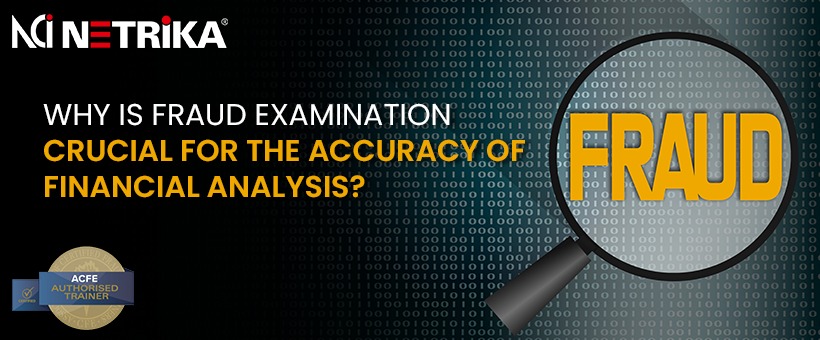News & Events
Why is Fraud Examination Crucial for the Accuracy of Financial Analysis?
- February 27, 2024
- Posted by: marketing@netrika.com
- Category: Blogs

The ACFE’s 2020 Global Fraud Study indicates that the typical loss resulting from financial fraud is $954,000.
Financial fraud is a white-collar crime that can be carried out by both insiders in management who want to show the company in a more positive financial light or outsiders who are driven by the desire for personal benefit. Organizations can be vulnerable to financial fraud due to several reasons including but not limited to their manual accounting systems, weak internal controls, or dishonest and too assertive CEOs. Preventing financial fraud is often considered the key to effectively addressing it and specialists with a certified fraud examination credential are the gold standard for containing this challenge.
The Importance of Fraud Examination for the Accuracy of Financial Analysis
- Fraudulent Activity Detection: Professionals who undergo a certified fraud examiner course and obtain the credentials incorporate a systematic investigation process. This encompasses assessing and analyzing financial transactions, records, and other relevant activities that can resurface traces of financial misconduct. Moreover, fraud examination credential enables professionals to leverage massive amounts of reliable data and uncover fraudulent activities.
- Preservation of Financial Integrity: Financial analysis accuracy is crucial to safeguarding the integrity of the organization. Professionals with fraud examination credentials understand that fraudulent actors can easily distort financial data which later can be misrepresented to masquerade the true financial standing of the company. By conducting thorough and reliable fraud examinations, professionals can uncover such misleading information and preserve the integrity of the company.
- Protection of Resources and Assets: A certified fraud examination course enables professionals with skills and knowledge to identify and address the vulnerabilities in an organization’s internal controls and operations. They are skilled at uncovering even the most cutting-edge potential risks and help the organization take timely corrective actions to prevent further financial loss.
- Risk Mitigation: Fraud examination is directly related to preserving the financial standing by mitigating potential risks that loom over any organization. Professionals with certified fraud examination credentials proactively address fraud cases to prevent reputational damage, financial losses, or legal liabilities.
Fraud examiners are equipped with specialized expertise and resources to detect fraudulent activity. Typically, an organization hires or consults fraud examiners to investigate financial challenges, vulnerabilities, and possible fraud. They have been asked to assist the company in resolving a specific fraud claim and establishing whether or not fraud has occurred, as well as who the perpetrator may be. Professionals with a certified fraud examiner credential (CFE certification) identify the fraudster and evaluate the gaps in internal controls.

